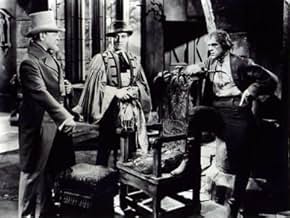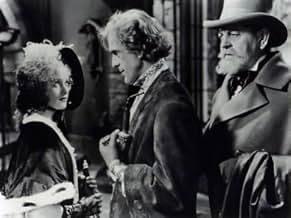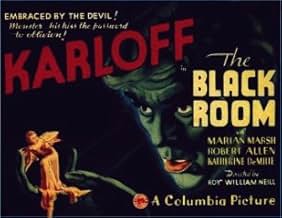Ignoring an ancient prophecy, evil brother Gregor seeks to maintain his feudal power on his his Tyrolean estate by murdering and impersonating his benevolent younger twin.Ignoring an ancient prophecy, evil brother Gregor seeks to maintain his feudal power on his his Tyrolean estate by murdering and impersonating his benevolent younger twin.Ignoring an ancient prophecy, evil brother Gregor seeks to maintain his feudal power on his his Tyrolean estate by murdering and impersonating his benevolent younger twin.
- Mashka
- (as Katherine de Mille)
- Court Clerk
- (uncredited)
- Anton as a Child
- (uncredited)
- Franz - Captured Assassin-Villager
- (uncredited)
- Gregor's Hairdresser
- (uncredited)
- Karl - Lead Villager
- (uncredited)
- Member of the Court
- (uncredited)
- Member of the Court
- (uncredited)
- Michael the Footman
- (uncredited)
- Gatekeeper
- (uncredited)
Featured reviews
An interesting star vehicle for Boris Karloff allowing him to play two roles as contrasting twins; the fact that one of them is deformed may owe something to Lon Chaney and here Karloff demonstrates himself a most worthy successor to the Master's mantle. The period setting - its-folk-tale quality hearkens back to German Expressionism - serves the handsome production extremely well, especially when considering that Columbia Pictures at the time was just starting to pose a serious challenge (following the Oscar sweep of Frank Capra's IT HAPPENED ONE NIGHT [1934]) to the major studios. Director Roy William Neill handles the proceedings with great efficiency and style providing plenty of visual flourishes along the way.
The only criticism one can level at the film regards a couple of slightly contrived plot points: the evil Karloff, who has done away with his benign but paralyzed sibling and whom he impersonates in order to win the girl he loves, is rather stupidly caught by the girl's father when he is spotted in a mirror using his 'lame' hand to sign the marriage contract; Karloff's come-uppance is brought about by his dead brother's faithful mastiff which hates his guts - it's implausible to think that the dog has kept away from Karloff for days (by which time the girl's lover has been convicted for her father's murder) only to conveniently reappear on his wedding day! However, the ironic climax - which allows the prophecy tied with Karloff's family name to be fulfilled - is a splendid one.
All in all, along with THE MASK OF FU MANCHU (1932) and THE WALKING DEAD (1936; see below), THE BLACK ROOM is Karloff's best vehicle of the 1930s which wasn't produced by the studio which made his name, Universal.
Well, history doesn't exactly repeat itself. The older twin, Gregor turns out to be evil, and the younger twin, Anton, though disabled and without property of his own, is a good and generous soul. Gregor invites Anton home to "help him" - which, unknown to Anton, is actually part of a devilish escape plot by Gregor whose subjects are boiling over with rage from all of the women who have gone missing in the castle over the years. Both brothers take a fancy to the daughter of Colonel Hassle, Thea (Marian Marsh), though Thea actually loves a soldier. Thea is quite uneasy with the affections of Gregor, given his polite but menacing demeanor and all of those rumors about missing girls. So how can Gregor manage to both get the girl and get away from the angry villagers? Watch and find out.
The plot is extremely clever and ironic, Karloff's acting is superb with his roles seemingly tailor made for him, and the supporting players are very good, but there really isn't much atmosphere in this one to the point that it is really difficult to classify it as horror. Its strength is in its screenplay and in Karloff's performance, not its visuals. Still, I'd recommend this one.
By Columbia Pictures standards, this film is almost opulent, having several sets and a number of outdoor shots, and having good actors, costumes, technicians and atmosphere all around. But, since it is a Columbia Picture, central Europe looks amazingly like Southern California. Still, it proves that Universal did not have a monopoly on horror in the 1930's.
This is not a supernatural film, except perhaps in the fact that it deals with the subjects of prophecy and fate...it is instead a psychological horror film and so it helps to have the right set of expectations going in. In a way, this film is a kind of precursor to the ambiguous metaphysics and psychological themes of the 1940's Val Lewton horror/noir classics.
What makes this film stand out is Karloff's brilliant performance in the double role of twin brothers, one evil and one good. Karloff is completely convincing in both parts, and it is a genuine pleasure to watch him. It is also striking that even without monster make-up Karloff can scare the pants off you, when he chooses.
Modern horror fans are liable to have trouble accessing this film, but it is recommended to fans of classic horror and classic film in general.
Did you know
- TriviaPresent existent version, as presented on Turner Classic Movies, bears title and end credits redesigned for the 1955 wide screen re-release.
- GoofsThe film is set in the early 1800s, yet a statue of St. Therese of Lisieux (Therese Martin) is prominently displayed in the castle three times (at around 17 mins, 40 mins, and 47 mins). Therese Martin was not born until 1873. Furthermore, no statue of St. Therese was made or displayed until after she was canonized, in 1925.
- Quotes
Mashka: Don't you want to kiss me?
Baron Gregor de Bergmann: [Cutting a juicy pear with his knife and eating it as he talks] A pear is the best fruit!
Mashka: Every time you see her, you want to be rid of me.
Baron Gregor de Bergmann: [Seemingly ignoring her] Lots of juice in a pear!
Mashka: Well, you'll find out I'll not be got rid of so easily! Do you hear what I say?
Baron Gregor de Bergmann: Adam should've chosen a pear.
Mashka: You've got it all planned, haven't you? You're gonna marry her. You're gonna make her your wife, your baroness!
Baron Gregor de Bergmann: I like the feel of a pear! And when you're through with it...
[He carelessly tosses it across the room]
- ConnectionsFeatured in Monday Night Fright: The Black Room (1962)
- How long is The Black Room?Powered by Alexa
Details
- Release date
- Country of origin
- Language
- Also known as
- The Black Room
- Filming locations
- Culver City, California, USA(Exterior Castle set and Exterior Tyrolean town at the RKO Forty Acres Backlot)
- Production company
- See more company credits at IMDbPro
- Runtime1 hour 8 minutes
- Color
- Aspect ratio
- 1.37 : 1
Contribute to this page




































